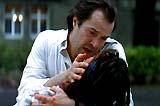
|
The Lives of Others (2006, Germ.)
(aka Das Leben der Anderen)
In writer/director Florian Henckel von Donnersmarck's
dramatic thriller (his debut feature film and the Oscar winner for
Best Foreign Film) - an acclaimed German socio-political drama and
character study set in the 1980s:
- the scene of the bugging of suspected but successful
Socialist playwright Georg Dreyman's (Sebastian Koch) apartment
by the East German Stasi (secret police)
- the keyhole shot of an apartment neighbor noticing
the activity and being threatened to keep silent
- the continual round-the-clock monitoring of Dreyman's
activities by survelliance agent Hauptmann Gerd Wiesler (Ulrich Mühe
in his final role before his death in a part written specifically
for him by the writer/director) who was slowly transformed into being
a conflicted but sympathetic 'guardian angel' (in the elevator scene
with a young boy)
- the scene in which Dreyman's devoted lover, beautiful
actress Christa-Maria Sieland (Martina Gedeck) cleansed herself (both
physically and emotionally) in the bathtub/shower of the filth after
a forced sexual encounter with Cultural Department head Minister
Bruno Hempf (Thomas Thieme) in the backseat of his limousine (in
exchange for prescription drugs and protection)

|

|

|
|
Unwanted Sexual Encounter
|
Christa-Maria
Cleansing Herself
|
Christa-Maria to Georg Dreyman: "Just Hold
Me"
|
- the scene of the comforting of Christa-Maria by
Dreyman when she was curled up in a fetal position, and she requested: "Just
hold me"
- Wiesler's failed attempt to emulate the tenderness
of CMS' and Dreyman's relationship with a rigidly-scheduled prostitute
in his drab apartment
- the heart-breaking scene in which a distressed Christa-Maria
committed suicide by running in front of a truck after she thought
she had betrayed Dreyman by revealing the location of his incriminating
red-ribboned typewriter that he had used to pen an anonymous article
(ironically about suicide in East Germany) for West German magazine Der
Spiegel - she was unaware that Wiesler had secretly removed the
typewriter from under the apartment's doorsill to protect her and
Dreyman
- the scene of Georg's anguish over Christa-Maria's
bloody death in the street
- the scene in which a demoted Wiesler quietly walked
out of his dead-end mail-steaming job nearly 5 years later when the
Berlin Wall came down in 1989
- the final sequence in which Georg discovered that
Wielser had protected him when he read the declassified surveillance
transcripts on himself, and discovered a thumbprint smudge of red
ink (from the red-ribboned typewriter) next to his official notation
HGW XX/7
- the scene of Georg locating Wiesler (now a newspaper
deliveryman) and deciding not to introduce himself to the humbled
man
- the final scene two years later when Wiesler saw
a bookstore poster advertising a new book written by Dreyman titled "Sonata
For a Good Man" and its dedication: "HGW XX/7 gewidmet,
in Dankbarkeit. (Dedicated to HGW XX/7, in Gratitude)"
- the film's final line of dialogue: Wiesler's subdued,
double-entendre reply to the cashier's question if he'd like the
book he was purchasing gift-wrapped: ("No, it's for me")
|

Keyhole View of Neighbor, Watching E. German Secret Police
(Stasi)

Agent Hauptmann Gerd Wiesler

Wiesler with Prostitute


Suicidal Death of Christa-Maria - in Georg's Arms


Thumbprint of Red Ink


Wiesler Buying Dreyman's Latest Book: "It's
for me"
|










